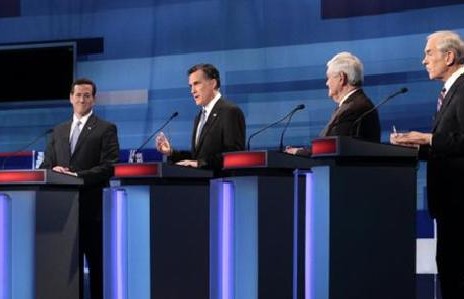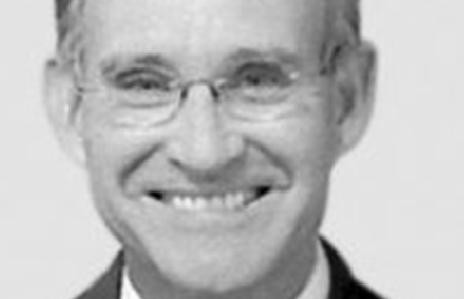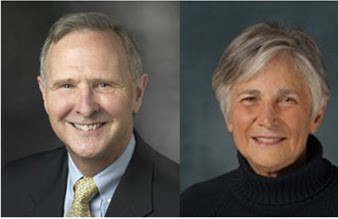
What the US Presidential Candidates Should Be Talking About
Three questions regarding education the 2012 presidential hopefuls should be pressed on.
This post is also available in: Spanish
On April 23, EDUCA—Business Action for Education—presented the report The State of Teacher Policies in the Dominican Republic (available in Spanish) to the national education authorities, businessmen, social organizations, university presidents, the educational community, and the general public. This document, prepared as part of a project led by the Inter-American Dialogue and supported by the Inter-American Development Bank for Central America and the Dominican Republic, seeks to make teacher policy a priority on the national agenda, qualify the debate, and strengthen civil society efforts for improving the design and implementation of education policies.
The event was attended by over 120 guests, including education authorities, presidents of teacher-training universities, businessmen, and the media. The event’s success demonstrates the central role that the issue of teaching has in the educational agenda of the Dominican Republic.
The Dominican Republic today is undergoing a profound transformation of its educational policies. The allocation of 4% of GDP to the pre-university education sector in the 2013 budget has led to a set of simultaneous actions attempting to transform the educational sector.* Adding an additional classroom for each existing classroom, expanding the school day to an extended model, transforming the curricula, changing the structure of the system, and deepening and increasing competition for teacher selection processes are just a sample of the changes. Together, they have led some first class analysts and actors to call the process revolutionary. In the context of these transformations, the Dominican Republic signed a National Pact for Education Reform in April 2014 with the aim of overcoming past obstacles to changes in the educational system.
The research conducted by EDUCA and the Inter-American Dialogue identified progress on issues such as increasing the demands of entry to the teaching profession, developing continuous training programs, and implementing certification strategies for teacher skills, professional development, and independent technical evaluations. The study also helps to corroborate some certainties already known in the past (e.g. classroom time and the school calendar have not been followed as expected, which is not in line with a quality-oriented system).
But perhaps the most important impact of this study was to focus public attention on teacher policy issues that were already known by the academic community, but were ignored by public opinion. These are: (1) how much Dominican teachers know; and (2) how teachers are incentivized and rewarded.
With respect to how much Dominican teachers know, in 2013, the Dominican Institute for Research and Evaluation of Educational Quality (IDEICE) developed a study using mathematics scores from the teacher application process. The study showed that out of 100 points, 52.13% of teachers failed to score above 60 points and only 1.18% scored above 90. Importantly, this poor performance does not vary according to the age group of teachers. Even more strikingly, performance was not correlated with educational background. On average, college graduates scored 49.28 points out of 100, while those with teacher titles scored 46.02, those with bachelor’s degrees 46.48, those with specialization 49.05, those with master’s degrees 45.56, and those with doctorates a disgraceful 32.55.
As for incentives for teaching, the study shows that—for full time teachers—Dominican teachers are the best paid compared to other countries studied (El Salvador, Guatemala, and Honduras). However, during the dissemination of the report, EDUCA encountered the ‘collective misconception’ (imaginario colectivo) that teachers earn poor pay. In fact, on average teachers in the Dominican Republic earn 35% more than the average starting salary of other university graduates. Conditions have changed significantly in recent years to the point that today the salary of a Dominican teacher sits in the highest quintile of society.
However, there is also evidence that teachers receive much less money than what is set on paper. Among the required deductions is a 1% allocation that every public-sector educator must pay to the teacher union. There are also voluntary discounts retained by the Ministry of Education for the National Cooperative of Teachers. In the end, the income of teachers falls dramatically. For example, 54% of teachers receive less than $190 in their pockets at the end of the month, even though theoretically their salary exceeds $800. In fact, only 3.8% of Dominican educators receive over $340 monthly from the $887 dictated in their salary. It is noteworthy to mention that any worker who wants to take a line of credit in a bank, according to current regulations, has a debt ceiling set at 40% of his or her nominal income.
A highly indebted faculty with significant retained earnings by employers obviously affects motivation and performance. Ironically, the Ministry of Education serves, involuntarily, to burden teachers with debt through salary increases that are costly to the Dominican society. The system fuels a set of working conditions that are not conducive all children and adolescents to receiving a quality education.
Enrique Darwin Caraballo is the CEO of EDUCA, an organization that represents the business sector in education matters in the Dominican Republic.
*Before 2013, the budget for pre-university education had never been over 2.3% of GDP, even though the Education Law in place since 1997 required a minimum of 4% of GDP or 15% of public expenditure (whichever was higher).
Three questions regarding education the 2012 presidential hopefuls should be pressed on.
This post is also available in: SpanishFormer Nicaraguan Minister of Education Humberto Belli recently shared with us his article published in La Prensa on the subject of teacher pay. Belli co-chaired the Task Force on Education in Central America that produced PREAL’s Central American Regional Report Card in 2007 and was a member of the…
Debate on the pros and cons of dismissing the lowest-performing teachers in US schools.

